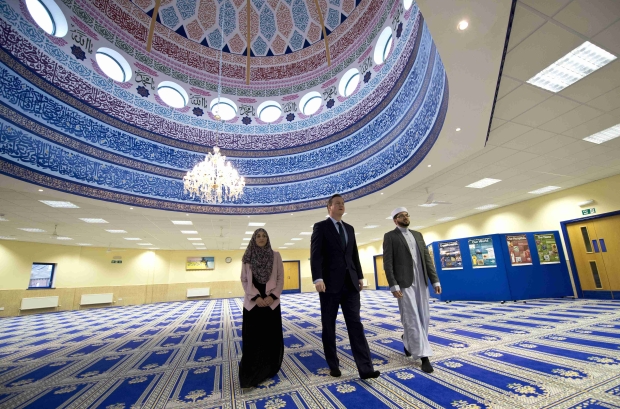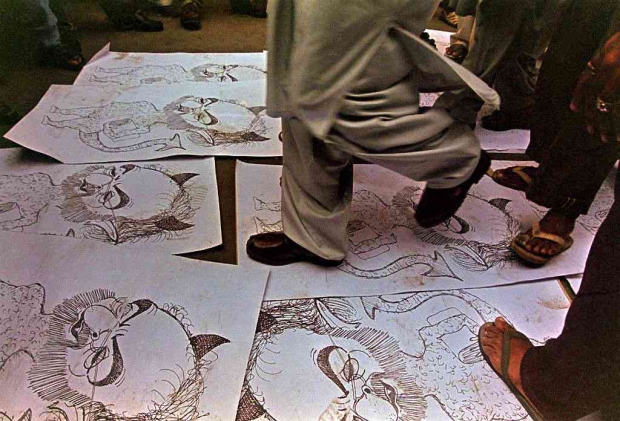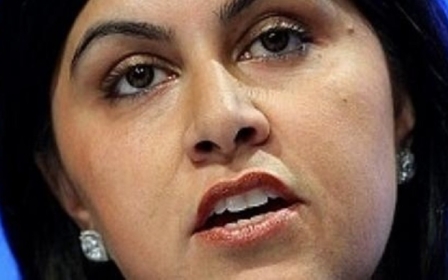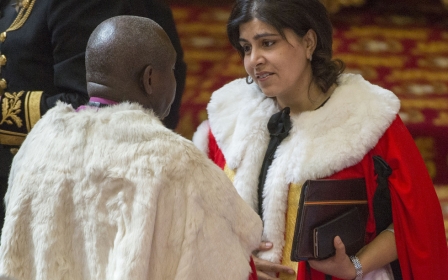How the right-wing press smeared Sayeeda Warsi
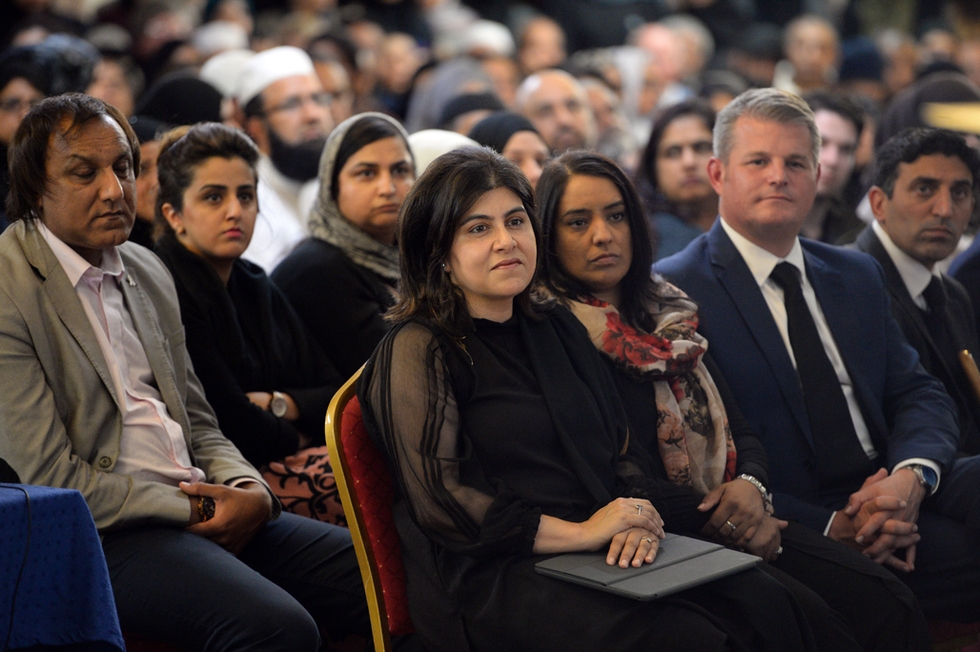
I cannot remember any book by a mainstream politician being received with such naked malevolence as Sayeeda Warsi’s The Enemy Within.
Let’s take the example of Douglas Murray’s review in the Sunday Times. Almost every sentence is a sneer.
More seriously, the Murray review contains a series of false and seriously misleading statements about what Baroness Warsi actually wrote.
On page 123 of her book, Warsi tells the story of how, as a confidence-building measure after the murder of Fusilier Lee Rigby, David Cameron asked her to find him a mosque to visit.
These attacks are part of a serious and largely successful attempt to shut down debate on an issue at the heart of community relations and social cohesion
Warsi records that she duly did so, adding that the event was a "great success".
She then reveals: “And yet a few months after the visit I was hauled in to No 10 and rebuked for my choice of mosque. The prime minister’s chief of staff, now Lord Llewellyn, told me, ‘It was your job to protect David.' When I asked what the concerns were, none was forthcoming. Frustrated by this cloak and dagger approach, I asked for concerns to be put in writing. Nothing was ever sent back."
It is a revealing story. Warsi tells it to illustrate what she calls "paranoid" government inside David Cameron’s Number 10.
In his review, Douglas Murray gives his own version of this story. He states that Baroness Warsi “doesn’t name the mosque or give any context".
Murray witheringly concludes that “while deftly withholding such facts, the author presents the criticism of her colleague as simply another injustice against her". He accuses her of using the same “technique of misrepresentation and slight” to attack other politicians as well.
Any readers of the Sunday Times would come away from this review with the damning impression of Baroness Warsi as a politician who was ready to dissemble and conceal relevant facts in order to damage opponents.
However, the Murray account is almost completely misleading.
Cameron never visited Birmingham Central Mosque while he was prime minister. He did do so in 2007 in a visit also arranged by Warsi
Warsi’s book makes it unambiguously clear that the mosque visit in question took place in 2013, when David Cameron was in government. Cameron never visited Birmingham Central Mosque while he was prime minister. He did do so in 2007 in a visit also arranged by Warsi (as she states in her book).
Murray is right to record that the 2007 visit went badly. However, the mosque visit which Warsi is talking about - the one in 2013 - concerned the Jamia Mosque in north Manchester, and was nothing at all to do with Birmingham. The Jamia Mosque has a long history of service to all sections of the local community and has never been associated with extremism.
Rushdie affair
I now turn to Murray’s second important misrepresentation concerning the Warsi book. This concerns her account of the Satanic Verses controversy in 1989.
This is what Douglas Murray writes: “Warsi appears to believe that the government was wrong to defend Rushdie and that a prosecution for blasphemy in 1989 could have gone some way to avoiding our present troubles.”
She actually describes the British government response as "both measured and considerate” and criticises British Muslims who wanted to use the blasphemy laws.
This is what she actually wrote (as opposed to what Douglas Murray says she wrote):
“But Muslims wanted the blasphemy laws extended to them, and they wanted the state to prosecute. They wanted British laws to protect Islam and indeed other religions as they did Christianity. When neither demand was met the government was accused of hypocrisy by British Muslims. These accusations, I believe, stemmed both from misjudged and misunderstood positions and statements both around the blasphemy law and its evolution over the last century. The law was seen by most in politics and the judiciary as a relic of the past and at the time of the Rushdie affair hadn’t been used by the police and the state for nearly seventy years."
Baroness Warsi then goes on to criticise British Muslims who launched a private prosecution of Salman Rushdie for what she calls a "number of deep misunderstandings".
It is true that she also states that “Britain hadn’t even started to understand the depth and sincerity of belief within Muslim communities” and failed “to grasp what Muslims rightly or wrongly would find deeply offensive and interpret as a personal attack on them".
But this falls a very long way of support for the blasphemy law.
'Blood on her hands'
I now turn to a second and even more vicious critic of Warsi. This is Colonel Richard Kemp, the former British commander in Afghanistan who has, it is worth noting, consistently defended Israel against claims that it committed war crimes in Gaza.
Colonel Kemp is a brave man, but I am afraid earlier this month he wrote a dreadful collection of bilge about Warsi.
There is no reason for Colonel Kemp to know this, but actually Warsi is one of a small number of British public figures on the Islamic State kill list
In an article for the Jewish News, the colonel accuses Baroness Warsi of “likening the Israel Defence Force to the Islamic State".
This enraged Colonel Kemp: “This will make Islamic jihadists sniff blood. It will encourage UK Muslims to join terror groups and embolden IS.”
He concludes that Baroness Warsi "has blood on her hands” - a very strong statement indeed – and one that should only ever be uttered with great care. I suppose there is no reason for Colonel Kemp to know this, but actually Baroness Warsi is one of a small number of British public figures on the Islamic State kill list published last year.
Colonel Kemp’s article made one strong point. He noted that Baroness Warsi failed to condemn the practice of employing foreign nationals in the British Army, pointing out this was inconsistent.
She does not do so in her book (though she does say that British citizens should be banned from serving in foreign armies, which would include the IDF).
Views on the IDF
And this brings me onto the third attack on Baroness Warsi, this one from Lord Polak, the honorary president of the Conservative Friends of Israel.
Just three days before Kemp’s virulent assault on Warsi, Lord Polak did accuse Warsi of “equating” Islamic State and the IDF:
“To equate the actions of the Israeli Defence Force and non-state actors that can include vile terror groups such as Daesh is misguided. This blasé attitude is both careless and shows a total lack of understanding of the only true democracy in the Middle East.”
This statement was a response to Warsi’s interview with the Middle East Eye last month in the wake of the publication of the book.
This is what she told us: “One of the questions I asked the Foreign Office was that we have a distinction between state actors and non-state actors.
“If you go out there and fight for any group, you will be subject to prosecution when you get back. If you go out and fight for Assad, I presume, under our law, that is okay. That can't be right.”
“The only reason we allow the loophole to exist is because of the IDF [Israel Defence Forces], because we are not brave enough to say if you hold British citizenship, you make a choice. You fight for our state only. That has to go out strong.”
And here is the transcript of the interview.
Islamist ideology
I now come onto a fourth attack on Warsi. In an Evening Standard review, Maryam Namazie stated that “according to Warsi, Islamist terrorism is the result of everything but Islamist ideology".
But Warsi does not claim anything of the sort. She makes it quite plain that Islamist ideology is linked to terrorism. Here is what she writes (page 104):
"Despite my reservations about the current definition of ideology, I do believe we must address religious ideology as a driver of terrorism. It’s important for us to support scholars and activists within British Muslim communities and wider to push back theologically against those who selectively adopt verses from the Quran and twist interpretations to justify violence against innocents.”
She certainly does provide a sophisticated analysis arguing that all kinds of factors and not just ideology lie behind so-called Islamic terrorist attacks. But that is not the same as denying a link between Islamist ideology and terrorism, as Namazie asserts.
Namazie, like Murray, makes a meal of Warsi’s account of the Rushdie affair, denouncing her as a "good apologist who is more concerned with blasphemy than murder, and who homogenises ‘Muslim sentiment’ to coincide with her own".
Namazie’s claim that Warsi is 'more concerned with blasphemy than murder' is ignorant and false. She owes her an apology
As I have demonstrated above, this is a gross misstatement of Warsi’s position. Indeed Warsi has long been an outspoken campaigner on blasphemy issues. In 2007, she travelled to Sudan to help negotiate the release of British teacher Gillian Gibbons, imprisoned on trumped-up blasphemy charges.
When she was at the Foreign Office a few years later, she was the only member of the government who spoke about opposition to blasphemy laws as a core part of the Foreign Office freedom of religion and belief human rights strategy.
So Namazie’s claim that Warsi is “more concerned with blasphemy than murder” is ignorant and false. She owes Baroness Warsi an apology.
The critics' responses
With the exception of Namazie (whose contact details I could not readily obtain and only attempted to contact a few hours before this article was published), I have engaged with all the writers I have criticised ahead of publication of this article. They all responded quickly and courteously.
Colonel Kemp (with whom I occasionally share the op-ed pages of the Daily Mail) explained that he was travelling and could not comment. Douglas Murray (a brilliant writer, and we are both associate editors of the Spectator) insisted that “I wholly stand by the review”, adding that “it is simply a bad book by a person who could have done some good in public life but didn’t".
The fullest and most interesting response came from Stuart Polak, who I have known for 15 years.
In the course of a long conversation he told me: “I stand by what I said. Look at her quote in the Middle East Eye story. She is arguing that state actors and non-state actors should be treated in the same way. That’s what she’s saying.”
I pointed out to Lord Polak that she didn’t even mention Islamic State in her quote, but he stuck to his guns and insisted that his response had been formulated "very carefully”.
So be it. I have known Lord Polak for 15 years. Although we have been on the opposite side of some (though far from all) arguments, he has always been straightforward and honourable in our dealings. And he stops far short of Colonel Kemp’s lurid argument.
In my view, Lord Polak stretches his logic past breaking point, while Colonel Kemp's claim that Baroness Warsi has "blood on her hands" is unsupportable.
However, I should own up to personal bias. I have known Baroness Warsi for approximately a decade, and I read her book before publication. Some words of mine in praise of it appear on the back cover.
It is worth starting that several of the reviews of Baroness Warsi's book, for instance, by Sameer Rahim in the Telegraph earlier this month have been fair-minded.
However, I simply do not recognise Baroness Warsi's book in the accounts I have described above. The book I read was well informed and balanced. It is important to note that significant parts of it are highly critical of the backwardness and sectarianism of parts of the Muslim community. (I will draw attention to these when I publish my own review in the MEE shortly. This review will also explain more fully exactly what Baroness Warsi does believe.)
I think these brutally hostile assaults on the Warsi book points to a real problem. They are part of a serious and largely successful attempt to shut down debate on an issue at the heart of community relations and social cohesion.
Very few mainstream public figures have the courage to present an informed Muslim perspective on the argument. It is disastrous that those who do should be systematically denigrated by establishment voices who plant words in their mouths which they never said.
- Peter Oborne was named freelancer of the year 2016 by the Online Media Awards for an article he wrote for Middle East Eye. He was British Press Awards Columnist of the Year 2013. He resigned as chief political columnist of the Daily Telegraph in 2015. His books include The Triumph of the Political Class, The Rise of Political Lying, and Why the West is Wrong about Nuclear Iran.
The views expressed in this article belong to the author and do not necessarily reflect the editorial policy of Middle East Eye.
Image: Baroness Sayeeda Warsi (C) joins people at a vigil in the Indian Muslim Welfare Society's Al-Hikmah Centre in Batley, northern England, on 17 June 2016 in remembrance of Labour MP Jo Cox who was killed on a street in Birstall on 16 June (AFP)
New MEE newsletter: Jerusalem Dispatch
Sign up to get the latest insights and analysis on Israel-Palestine, alongside Turkey Unpacked and other MEE newsletters
Middle East Eye delivers independent and unrivalled coverage and analysis of the Middle East, North Africa and beyond. To learn more about republishing this content and the associated fees, please fill out this form. More about MEE can be found here.



